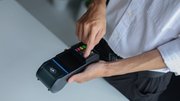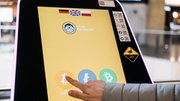News
Personal touch helps promo new transactions
Banks used tellers to help introduce ATMs to their customers in the late 1960s and early '70s. Now, several companies that are introducing new self-service transactions, including 7-Eleven and Delta Air Lines, are bringing back the personal touch.
April 28, 2003
When it comes to introducing a new technology, perhaps the biggest hurdle is getting people to try it.
Banks encountered this problem when they first deployed ATMs in the late 1960s and early '70s -- but surmounted it by enlisting tellers to show people how the machines worked.
Using tellers was a stroke of marketing genius.
In short order, the ATM became truly self service and a valued convenience to boot, with more than 350,000 of them installed in the past 30 years. Tellers returned to their posts behind the counter, and few of today's users can recall asking for assistance at the ATM.
As new self-service transactions are introduced, however -- some of them designed to appeal to non-ATM users -- companies like 7-Eleven are reviving the concept of on-the-spot customer service representatives.
The convenience store chain has been using greeters to help introduce its multi-functional, NCR-manufactured Vcom units since the first pilot of the concept in Austin, Texas, in 1998.
Chris Bailey, 7-Eleven's manager of customer support, said that 7-Eleven works with staffing firms that specialize in placing temporary workers at retail locations.
Let us introduce you
The greeters are generally utilized for 4 to 6 weeks after a kiosk is placed. Their primary goal is to enroll users in the check-cashing program, which has become Vcom's marquee application.
 |
7-Eleven believes that a dose of personal interaction, offered via a greeter, will convince more more users to try its Vcom kiosk. The same approach worked for banks in the early days of ATMs. |
"The key business drivers are the ATM and check cashing transactions. The other (transactions) are opportunities for incremental revenue," said Jay Giesen, manager of the Vcom program, in an address at last November's Retail Delivery Conference in Atlanta.
(See related story 7-Eleven's Vcom wins raves at RD)
"(The greeters') job is to talk with customers as they're entering or leaving a store, get them over to the Vcom and show them how (check cashing) works," Bailey said, adding that greeters use $5 coupons that customers can cash as their first "check" as an added enticement.
Though he didn't provide specific data backing the use of greeters, Bailey said, "Without a doubt, the number of members signed up for check cashing significantly increases when there is a greeter in the store. We like to think that the direct personal interaction has something to do with that."
Greeters are encouraged to work closely with store staff to help ensure that customers notice the Vcom, Bailey said.
All 7-Eleven employees can cash their paychecks for free at the kiosks, which gives them firsthand knowledge of how the process works. In addition, 7-Eleven offers cash and other prizes to stores that hit Vcom enrollment targets.
Greeters are helpful because 7-Eleven is offering a transaction set unlike any other deployer, Bailey said. "Nobody else is doing what we're doing. So there's a bit of an 'intimidation factor' for us to overcome."
The segue
Unizan Bank, a financial institution with 45 branches in Ohio, stationed a bank employee in the lobby to help introduce its customers to a new RemoteTeller system. Customers and tellers interact via a two-way closed circuit television system at the RemoteTeller, which is manufactured by Diebold.
(See related story RemoteTeller beats ATM in personality contest)
Because of the somewhat unusual interface, Unizan recognized it might need to coax customers into trying the RemoteTeller. It positioned a longtime teller -- one who was well liked by customers -- to greet customers and direct them to the RemoteTeller, when appropriate, or to other areas of the bank.
"We didn't want customers to walk in, see (the RemoteTeller) and not know what it was or how to use it," said Derek Williams, Unizan's senior vice president and chief deposit officer. "We wanted to make sure their initial contact with it was a positive experience."
The approach was especially effective with Unizan's older customers, who largely took to the technology after receiving a personal demonstration, Williams said.
Market research
Wells Fargo also uses tellers to greet customers at some of its busiest branches and guide them to various areas of the bank.
"It's more about looking at the whole customer experience and getting them to the channel that can best serve them," said Jonathan Velline, Wells Fargo's senior vice president for ATM Banking. "When we just have someone standing at the ATM, their primary incentive is getting people to use the ATM rather than educating them about all of our channels."
The exception, Velline said, is when Wells pilots new ATM transactions such as last year's test of envelope-free deposits. In those instances, bank employees' primary purpose is conducting on-the-spot market research.
"They can e-mail customer feedback to us in realtime, which really helps us make the transactions easier and more intuitive for the customer," Velline said.
 |
Delta's lobby assist agents greet travelers at the airport and direct them to the most appropriate check-in alternative, which is often a kiosk. |
It's not just ATM deployers who are turning to customer service reps to boost new self-service transactions.
Not just ATMs
Lois Rossi, Delta Air Lines' general manager of corporate communications, said the airline uses lobby assist agents to "welcome customers as they come through the airport lobby and get them to the fastest check-in alternative," whether it's a kiosk, a Delta Direct remote phone or a live agent.
Lobby assist agents are cross-trained so that they can handle other tasks such as baggage check-in, Rossi said.
They are part of Delta's newly proactive approach.
"Ultimately, it's about getting the customer through the airport faster," Rossi said. "We don't want the customer to have to wait until they reach the counter to be served. Over and over, customers have told us the three things they value most are speed, convenience and control."
(See related story Delta to rely more on kiosks, phone banks for check-in)
It seems to be working. The number of Delta customers using check-in kiosks continues to grow, along with the airline's use of lobby assist agents. While some 7.4 million customers used the kiosks in 2002, 4.8 million have already done so in the first four months of 2003.
Lobby assist agents are becoming increasingly important as Delta continues to roll out new technologies and revamp its check-in areas to emphasize self-service alternatives. In 2003, Delta plans to add more than 400 kiosks to its current fleet of 533.
Delta also plans to add 440 Delta Direct phones, which connect customers to a remote reservations agent who can handle complex ticketing changes and transactions. Customers who are directed to the phones will be able to obtain boarding passes from nearby printers.
Delta will invest up to $30 million in new technology in 2003, Rossi said.
 ChatGPT
ChatGPT Grok
Grok Perplexity
Perplexity Claude
Claude












